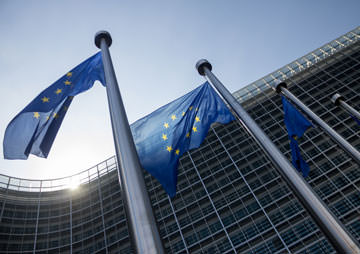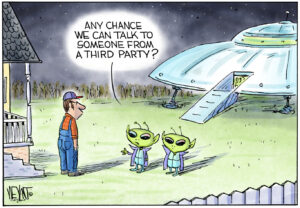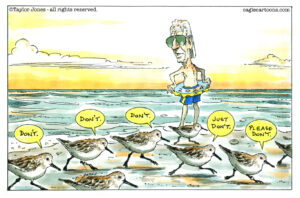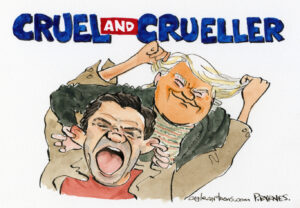The Election of a New European Parliament
Elections like those taking place this weekend are traditionally unsatisfactory, but this year they may provide an unprecedented shock. Shutterstock
Shutterstock
The coming weekend will see the election of a new European parliament. These elections traditionally are unsatisfactory because of the lack of a true and informed European electorate. This year they may provide an unprecedented shock. In France — the country mainly responsible for the European Union’s creation — a poll published May 20 says fewer than 40 percent of France’s citizens think the EU “a good thing,” 54 percent think the Euro’s more trouble than it’s worth, and less than half even plan to vote. Of those voting, 24 percent say they will vote for the right-wing Front National, more than for any other party.
That predicted result for the FN bears out that Europeans everywhere tend to vote in the European elections chiefly for their local significance. In France, where I write this, press and public inevitably will search the outcome of the vote for what it tells the national audience about national issues. The result is expected to be another blow to Socialist candidates and representatives of the smaller left-wing parties, and therefore a hostile message to France’s Socialist rulers.
The election is supposed to be about pan-European issues — economic austerity, trade policy, immigration and free passage throughout the Schengen group’s 18-nation membership. Foreign relations should be an issue, Europe’s relations with Russia, and with a United States that eavesdrops on European telephones, industry and governments, and makes unwanted trouble with a threatening Russia. But responsibility for all of this tends to be assigned to the responsibility of national governments.
The British vote will be read for what it says about the possibility of British withdrawal from the European Union. Prime Minister David Cameron has promised a referendum on that question, should the Conservative Party win the next national election, which is required a year from now (if not before). The so-called United Kingdom Independence Party, determined to get Britain out of Europe, is currently faring far better in British opinion than any past right-wing challenge to the country’s membership in the EU, and the fortunes of its candidates in the EU Parliament voting — in which UKIP has candidates in every region — will be of keen interest to pan-European opinion.
The vote in France will undoubtedly be a condemnation of French President François Hollande’s leadership. Turnout, rather than issues, will govern the assessment. In France’s municipal elections in March people had reason to go out and vote on strictly local issues, and only secondarily or indirectly on what they thought about the Hollande government; and even that proved a huge defeat for the Socialist-led coalition.
The fortunes of Marine Le Pen’s National Front party will be a big story internationally, with comparisons to the vote for right-wing candidates and right-wing parties elsewhere in Europe, and particularly in Britain, the Netherlands, Italy, Hungary and Greece. The question is whether Europe itself is moving rightward because of African and Middle Eastern immigration pressures, as well as domestic conflicts on social issues such as single-sex marriage (and adoption), and bias in Western Europe against Roms (Gypsies) from Romania and Bulgaria.
The sovereign European issues remain to be addressed, and will not be settled in the EU’s Parliament but by the governments of member countries. These are whether the EU will remain essentially an association of independent states, with important areas of federation, or tries to continue moving towards federation with a single executive authority, which in one or another form seems since the beginning to have been the vision of the European Commission.
Much has been achieved in areas of economic and practical cooperation — the single market, the common currency, the common standards that have been established in an immense number of areas of shared action. But on the great issues of political existence, the efforts to bind Europe more closely have failed. The limits encountered by the Euro itself suggest why: the inability to establish the degree of economic unity and shared interests among the currency’s member states that would have allowed them equally to survive the current fiscal crisis. Instead, Germany and the northern nations have profited, and the so-called Mediterranean states suffered, and are likely to continue indefinitely to suffer so long as the doctrine of austerity prevails.
This is not some technical problem but one that is imbedded in economic history and national culture, and even the inherited religious culture of all these countries — in their inherited attitudes toward money, riches, and the primary values of civilization. Perhaps the most important of all lines of division in Europe has been that of religion. Catholic Europe traditionally considers riches corrupting, hence a moral danger. Protestant Europe has considered riches a sign of virtue and reward for merit. It is, of course, a division that equally exists in the United States.
The impossibility to establish anything close to a common foreign policy among the EU states has cultural origins too, but also is due to evident differences in national history, geography, and moral values.
A common European defense is possible and should be achieved because on this matter the question is simple — security and safety — and the obstacles have been unwillingness to pay the price for common defense, and the perceived lack of need to do so while the United States defended Europe in its own interest. That will end. Europe’s dependence on the U.S. inevitably will end. Then it will have to prepare to defend itself, and make decisions in a different world.
Visit William Pfaff’s website for more on his latest book, “The Irony of Manifest Destiny: The Tragedy of America’s Foreign Policy” (Walker & Co., $25), at www.williampfaff.com.
© 2014 Tribune Media Services, Inc.
Your support matters…Independent journalism is under threat and overshadowed by heavily funded mainstream media.
You can help level the playing field. Become a member.
Your tax-deductible contribution keeps us digging beneath the headlines to give you thought-provoking, investigative reporting and analysis that unearths what's really happening- without compromise.
Give today to support our courageous, independent journalists.






You need to be a supporter to comment.
There are currently no responses to this article.
Be the first to respond.